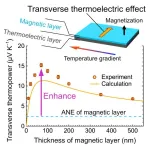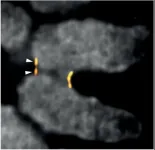(Press-News.org) In the weeks before and after the 2020 presidential election, researchers ran a number of tests to try to understand how much Facebook and its corporate cousin, Instagram, may be contributing to the nation's political divide.
One of those experiments — led by Matthew Gentzkow and Hunt Allcott, economics professors at Stanford University — centered on more than 35,000 Facebook and Instagram users who were paid to stay off the platforms in the run-up to Election Day. There’s a lot that researchers could glean from the social media hiatus, including whether people’s political attitudes shifted and in what ways. If views changed dramatically, that would support the argument that Facebook and Instagram, and social media generally, are helping to drive Americans apart.
The results of that deactivation exercise — the largest ever involving social media users and the first to include Instagram — are in: Staying off Facebook and Instagram in the final stretch of the November vote had little or no effect on people’s political views, their negative opinions of opposing parties, or beliefs around claims of election fraud.
But when it comes to Facebook’s impact on what people believed about current events, the researchers reached two conclusions. Those who were off Facebook were worse at answering news quiz questions, but they were also less likely to fall for widely circulated misinformation, suggesting that the platform can be an important conduit for both real and false news.
These findings, newly published by the Proceedings of the National Academy of Sciences, are in line with the main takeaways of the other experiments into Facebook and Instagram’s potential influence around the 2020 election, in which changing news feeds and limiting re-sharing of posts didn’t reduce polarization or change beliefs about whether the voting process was tainted. Those tests were detailed in four papers published in July 2023 in Science and Nature.
Taken together, the papers suggest that, when it comes to U.S. politics, Facebook and Instagram may not have as much ability to shape political attitudes during an election season as the popular narrative suggests.
And like the previous studies, the Gentzkow and Allcott-led study doesn’t absolve Meta Platforms, which owns Facebook and Instagram, from the messy state of U.S. politics. For one thing, the results support the view that Facebook may create harm by distributing misinformation. Gentzkow says it’s also possible that the platforms contributed to polarization in the past, even if people’s use of them in the run-up to the election had limited impact.
“We are not ruling out the possibility that Facebook and Instagram contribute to polarization in other ways over time,” says Gentzkow, who – along with Alcott – is a senior fellow at the Stanford Institute for Economic Policy Research (SIEPR).
He also notes another finding suggesting that using Facebook in the weeks before the 2020 presidential election may have made people somewhat more likely to vote for Donald Trump and somewhat less likely to vote for Joe Biden. This could suggest that, for Facebook users who still were on the site, Trump’s campaign was savvier at building support than Biden’s team was.
“This effect was not quite statistically significant, so we need to take it with a grain of salt,” Gentzkow says. “But if it’s real, it’s big enough that it could impact the outcome of a close election.”
The study led by Gentzkow and Allcott — and the four that preceded it — are part of a massive research project that has been billed as the most comprehensive, evidence-based investigation yet into the role of social media in American democracy.
The project came together following critiques of Meta’s role in the spread of fake news, Russian influence, and the Cambridge Analytica data breach. The collaboration between academics and Meta researchers involved a series of steps to protect the integrity of the research; Meta, for example, agreed not to prohibit any findings from being published. In all, nearly 20 external social scientists from universities across the country are part of the project, with the external academic team being co-led by Professors Talia Stroud (University of Texas-Austin) and Joshua Tucker (New York University).
“Access to Meta’s proprietary data has allowed us to jump over big barriers to research on extremely important issues involving social media and politics,” says Gentzkow, who is also the Landau Professor of Technology and the Economy in the Stanford School of Humanities and Sciences.
Gentzkow and Allcott’s study involved roughly 19,900 Facebook users and 15,600 Instagram users who agreed to stop using the platforms ahead of the 2020 election. About a quarter of them agreed to deactivate their accounts for six weeks before the November vote. The rest comprised a control group that logged off for just one week.
The study’s analysis relies on a number of measures, among them participant surveys, state voting records, campaign donations, and Meta platform data. Some participants also allowed the researchers to track how they used other news and social media services when they were off Facebook or Instagram.
On top of the findings on polarization, knowledge, and Republican support, the authors conclude that Facebook and Instagram help people engage in the political process — mostly through posting about politics and signing petitions online (voter turnout didn’t change).
Takeaways for 2024 and beyond
Gentzkow says that the study’s finding that Facebook and Instagram didn’t change people’s political attitudes or beliefs in claims of electoral fraud in 2020 is especially interesting in light of his previous research with Allcott. In an earlier smaller-scale study of Facebook users who stayed off the platform for a month ahead of the 2018 midterms, the authors did find evidence that it contributes to polarization.
The distinction, Gentzkow says, could be that people are aware enough of political issues during a presidential election, so Facebook and Instagram have little or no effect on their beliefs or attitudes. But during other elections, when information about candidates or issues are not so front and center, social media may have more influence over what people think.
“Even though Facebook and Instagram did not contribute to polarization in the runup to the 2020 election, it’s possible that they are helping to widen political divides in other contexts where people’s views are less entrenched,” Gentzkow says.
And though the study was limited to the six weeks leading up to the presidential vote, it’s still a critical time in U.S. politics — hence the phenomenon known as the “October surprise.”
“Things happen in the home stretch of a presidential election that can change poll numbers,” he says. “We’ve learned from this study that altering how much time people spend on Facebook and Instagram during that period isn’t likely to make a huge difference.”
END
New findings released from US 2020 Facebook and Instagram election study
2024-05-13
ELSE PRESS RELEASES FROM THIS DATE:
How miniature backpacks led to the discovery of the world’s largest hummingbird species
2024-05-13
Researchers from UNM’s Museum of Southwestern Biology (MSB) have uncovered the giant hummingbird’s extreme long-distance migration for the first time. Their eight-year study, Extreme elevational migration spurred cryptic speciation in giant hummingbirds published this week in Proceedings of the National Academy of Sciences, led them to another important discovery: The world’s largest hummingbird is a new species.
The team, led by Jessie Williamson, UNM Ph.D., 2022, included the Museum of Southwestern Biology at UNM, Pontificia Universidad Católica de Chile in Chile, and Centro de Ornitología ...
New synthetic biomarker technology differentiates between prior Zika and dengue infections
2024-05-13
A newly discovered Zika virus-specific synthetic molecule is capable of differentiating Zika-immune patient samples from samples of patients previously infected with the related dengue virus. The technology may lead to the development of better diagnostics and vaccine candidates, scientists announced today in the Proceedings of the National Academy of Sciences.
The study, led by researchers at the University of Pittsburgh School of Public Health and The Herbert Wertheim UF Scripps Institute for Biomedical Innovation & Technology, is the first to apply an innovative “epitope surrogate” technology to Zika. Until now, researchers and clinicians have lacked diagnostic ...
Fruit fly testes offer potential tool against harmful insects
2024-05-13
A way to curb nagging insects has been flying under our radar—an enzyme from fruit fly testes.
The compound could control bugs that carry disease and harm crops by stunting their ability to procreate, Johns Hopkins University researchers found.
“We have a toe in the door to control fruit fly populations with this enzyme,” said Steven Rokita, a professor of chemistry at Johns Hopkins who led the research. “It could offer a good way to control fertility of all kinds of biological and agricultural pests, starting with mosquito populations.”
The findings are set to publish ...
Exceptionally large transverse thermoelectric effect produced by combining thermoelectric and magnetic materials
2024-05-13
1. A NIMS research team has demonstrated for the first time ever that a simple stack of thermoelectric and magnetic material layers can exhibit a substantially larger transverse thermoelectric effect—energy conversion between electric and heat currents that flow orthogonally to each other within it—than existing magnetic materials capable of exhibiting the anomalous Nernst effect. This mechanism may be used to develop new types of thermoelectric devices useful in energy harvesting and heat flux sensing.
2. Seebeck effect-based ...
Researchers identify fastest rate of natural carbon dioxide rise over the last 50,000 years
2024-05-13
CORVALLIS, Ore. – Today’s rate of atmospheric carbon dioxide increase is 10 times faster than at any other point in the past 50,000 years, researchers have found through a detailed chemical analysis of ancient Antarctic ice.
The findings, just published in the Proceedings of the National Academy of Sciences, provide important new understanding of abrupt climate change periods in Earth’s past and offer new insight into the potential impacts of climate change today.
“Studying the ...
Research on centromere structure yields new insights into the mechanisms of chromosome segregation errors
2024-05-13
Researchers from the Kops group in collaboration with researchers from the University of Edinburgh, made a surprising new discovery in the structure of the centromere, a structure that is involved in ensuring that chromosomes are segregated properly when a cell divides. Mistakes in chromosome segregation can lead to cell death and cancer development. The researchers discovered that the centromere consists of two subdomains. This fundamental finding has important implications for the process of chromosome segregation and provides new mechanisms underlying erroneous divisions in cancer cells. The research was published in Cell on May 13th 2024.
Our bodies consist of trillions of ...
Ochsner Medical Center-Baton Rouge earns Acute Stroke Ready Certification from Joint Commission
2024-05-13
BATON ROUGE, La. – Ochsner Medical Center - Baton Rouge has earned The Joint Commission’s Gold Seal of Approval® and the American Stroke Association’s Heart-Check mark for Acute Stroke Ready Certification.
The designation means OMC-Baton Rouge meets The Joint Commission's designation for readiness to treat patients who experience severe stroke.
To achieve certification, OMC-Baton Rouge underwent a rigorous, unannounced onsite. During the visit, a team of Joint Commission reviewers evaluated compliance with numerous certification standards, including ...
CEHD researchers studying family-led early childhood systems change for educational equity
2024-05-13
CEHD Researchers Studying Family-Led Early Childhood Systems Change For Educational Equity
Colleen Vesely, Associate Professor, College of Education and Human Development (CEHD); Bethany Letiecq, Associate Professor, Research Methods, CEHD; Rochelle Davidson Mhonde, Assistant Professor, Global and Community Health; and Jung Yeon Park, Assistant Professor of Quantitative Research Methods, School of Education, received funding for the project: “Family-Led Early Childhood Systems Change ...
Raz receives funding for Intent-Based Orchestration In Distributed Command & Control (IBODC2) software
2024-05-13
Raz Receives Funding For Intent-Based Orchestration In Distributed Command & Control (IBODC2) Software
Ali ...
Kelly receives funding for civil war graffiti preservation
2024-05-13
Kelly Receives Funding For Civil War Graffiti Preservation
Mills Kelly, Senior Scholar and Former Director, Roy Rosenzweig Center for History and New Media (RRCHNM); Professor, History, has received funding from the National Endowment for the Humanities for: “Off the Wall: Digital Preservation of Civil War Graffiti Houses.”
Kelly will use the funding to support the building and publishing of a digital archive focused on soldiers’ graffiti found in Civil War-era structures located in the ...




